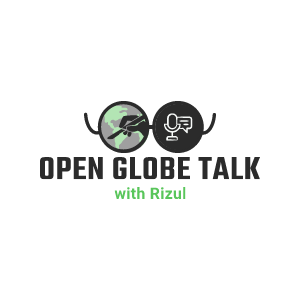December 31, 2021
Episode 17: Dr. Cristos Ifantides, MD MBA
A discussion on
“Global Ophthalmology as a Springboard for Specialty Innovation”
Dr. Cristos Ifantides, MD MBA
Welcome back to another episode of Open globe talk. We are joined today by Dr. Cristos Ifantides who is the Director of Ophthalmic Global Outreach and Assistant professor of Ophthalmology at the University of Colorado.
Dr. Ifantides obtained his MD and MBA from the University of Florida college of medicine and subsequently did his ophthalmology residency training at Icahn School of Medicine at Mount Sinai. He then did his fellowship training at Thomas Jefferson University/Wills Eye Institute in Academic Global Ophthalmology and Anterior segment. Listen in on this episode as Dr. Ifantides shares his journey and the incredible lessons he has learned, and goals accomplished as a physician innovator and global ophthalmologist!
Key discussion points:
Interest in Ophthalmology
Cross-over of vascular biology research and retinal biology research
Quality of life impact, ability to help patients in multiple ways
AmeriCorps Experience
Pre-medical advice
Highlighted the minimal resources some folks in our own country have and the unmet needs we need to address locally
Encourage the mindset: “Just not feel like you have to get done with something”. Preach the saying of having the journey be the most important and valuable life lesson for personal development
Use skillsets at present to help in any way and don’t rush into anything!
Implementing creative solutions from Global Ophthalmology training in current clinical practice in the US
Doing more with less
Medical waste and excessive instrumentation
Dropping cost, helping more people
MSICS training at The University of Colorado
Much less costly and less waste-producing
Incorporating Global Ophthalmology procedures in a large healthcare network
Comparing outcomes of non-phacoemulsification procedures to phaco
Spending time for research and education of the techniques being proposed for implementation are necessary
Changing perceptions
Patient Selection is also key
Time to build referral base
Research work in academia focused on underserved populations
Collaboration is key in both academic and private practice!
Academic focus: evaporative dry eye disease, mask-wear in vulnerable populations, addressing surgical complications in patients with poor dilation
Research on quality-of-care delivery based on languages spoken
Trauma database
White cataracts
Recent Global Ophthalmology work in Mexico
Dr. Ivo Ferreira Rios, MD
Common thread: “There are bright people everywhere and we need to reach them with educational opportunities”
Formalized training is imperative in:
Global Ophthalmology
Public Health
Two aspects to consider for innovation in the specialty:
1. Clinical outcomes
2. How financially sound the model is?
Requirements for Global Ophthalmology Fellowships
Multiple avenues should be offered tailored to a certain type of applicant (ie epidemiology route, surgically heavy in one country or in multiple countries, not surgically heavy…etc.)
Common pillars
Mirror local and global conditions
Inventing the rotary chop method
Early career advice for residents and fellows
The biggest thing you must know during your global training is that you cannot help by doing surgery abroad. The surgical part is you learning. What you can do to help is gain skills in residency. Learn supply chain issues which can be an obstacle for people working abroad, and also learn how to make clinic run efficiently.
Benefits of obtaining an MBA
Get a good understanding of cost during residency!
Episode-based Resources:


